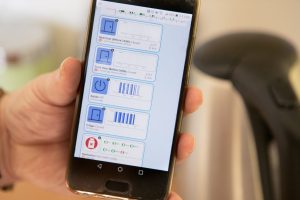Sunderland City Council named winners of Civic Innovation in Technology Award for innovative app

Sunderland City Council has been named winner of the 2020 Civic Innovation in Technology Award (Europe) from the Technology and Entrepreneurship Center at Harvard.
The Social Health Enabling Independent Living (SHEILA) App was developed by Sunderland City Council to help residents to live independently. The award serves as recognition of the Council’s innovative approach to supporting social care with the use of assistive technology.
Technology-enabled care has become a core element of the social care offered in the city and their efforts allow people who live with disability or long-term health conditions to be independent and gain confidence. Care services in the city are now well versed in helping families use GPS and other Internet of Things (IoT) devices to identify when a family member needs assistance and help them keep them safe when required.

Temp Core_App_Small c. Sunderland City Council
Users of the SHEILA app have described feeling empowered by the technology as it allows them to maintain vital social connections as well as living independently. Sunderland resident, Tracey Ganley, who uses the SHEILA app, has said “The assistive technology allows me to call my family and friends and speak to them on the telephone. […] This [the app] has greatly improved my quality of life.”
New technology continues to play a significant role in transforming the social care community. Sunderland’s digital ambitions have been driving the city forward to remain at the forefront of research and development around assistive technology (AT) and telecare solutions.
Using a range of next-generation technologies, connectivity and data to support the wellbeing of residents, the app was praised by the panel for is transformative innovation in the 2020 pandemic.
Re-imagining social care provision using technology to support individuals to live better, safer, lives in their own homes for longer sits at the app’s core. ‘Technology innovation and integration into a city platform’ was said to be a key driver in the judges’ decision to crown Sunderland City Council as winners of the awards. The app’s innovation in citizen engagement via smart solution, which is both expandable and portable beyond its successful preliminary pilot was also noted by the judges.
Embracing technology in Sunderland
Discussing the award, Patrick Melia, chief executive of Sunderland City Council, said: “It is with a huge sense of pride that I stand here not only as a representative of the UK’s smartest city for 2020, but now a leading European city as the recipient of this incredible accolade from the Technology and Entrepreneurship Center at Harvard on behalf of my council team and our valued partners.”
It is with a huge sense of pride that I stand here not only as a representative of the UK’s smartest city for 2020, but now a leading European city as the recipient of this incredible accolade
Born from a collective of several organisations collaborating on an IoT national testbed pilot, the app is made up of partners from Sunderland City Council, Sunderland Software Centre, the Digital Catapult North East and Tees Valley, health commissioners, the Local Government Association and NHS Digital.
With the app, Sunderland wants to help its carers and families make sure vulnerable people are safe when alone. To ensure this, the app monitors factors such as medication as well as offering an agile platform to offer appropriate support, alerts and prompts.

Patrick Melia c. Sunderland City Council
Additional functionality enables ‘push alerts’ such as SMS text messages, which allow a family/informal carer to passively monitor the wellbeing of the vulnerable individual. This is unique in the assistive technology market and pioneered by Sunderland City Council.
“In our smart city of Sunderland, technology is embraced as an enabler and essential driver for positive change, but there is very much a belief across the city that a ‘citizen first, tech second’ approach will continue to ensure the needs of individuals is at the forefront of our ongoing dynamic developments,” Patrick added.
Assistive technologies are now in place in over 650 homes across Sunderland and the Council have the ambition to reach 1,500 homes over the next 2 years. This makes a transformational difference to vulnerable and elderly people who want to live independently as well as providing much-needed reassurance for their loved ones.
